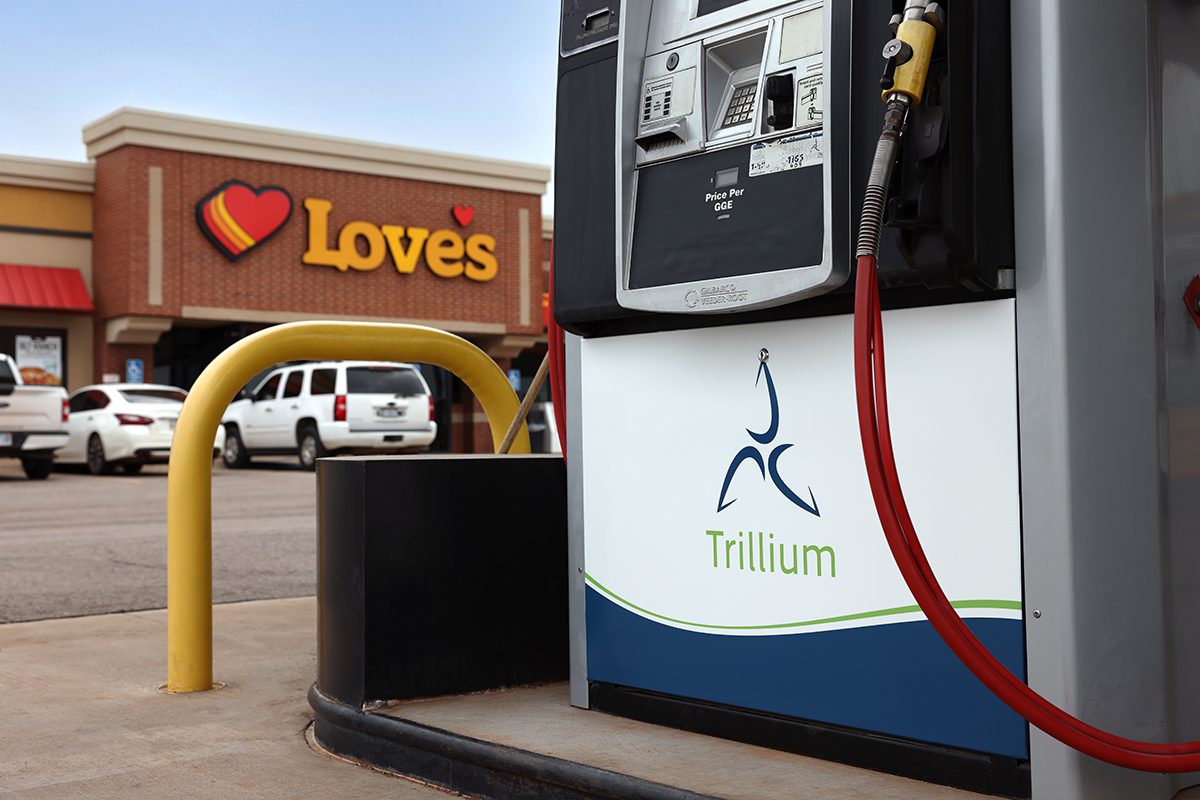With increasingly complex and varying regulations along with additional sustainability goals and initiatives, fleets can often face uncertainty when navigating the cleanest available heavy-duty vehicle technologies and fuels. Often clean vehicles come with a significant price tag when compared to traditional diesel-powered vehicles and are dependent on federal and state funding to make them cost competitive for fleets. Transitioning to natural gas vehicles fueled by renewable natural gas (RNG) offers a cost-effective and sustainable solution. Trillium, a member of the Love’s Family of Companies, leverages Love’s long history of servicing the trucking industry to provide innovative, clean fueling options without compromising business operations.
Low carbon natural gas is a clean-burning alternative fuel, producing up to 27% fewer carbon emissions than diesel, while providing safe and reliable technology that can perform on par with diesel technology. With a potential fuel savings of more than $200,000 over the lifetime of each vehicle, using today’s diesel and CNG prices, natural gas vehicles can also provide substantial fuel savings. Beyond fuel savings, natural gas vehicles are similar to diesel vehicles in terms of operational performance — with no compromise on power, acceleration, range, or cruising speed.
RNG is a renewable fuel made from the methane released when organic waste breaks down. RNG production facilities capture methane, a powerful greenhouse gas that would normally be released into the atmosphere and converts it to RNG. RNG can be produced from many sources including landfills, wastewater treatment plants, livestock farms, food production facilities, and organic waste management operations.
Transitioning to RNG-fueled vehicles saves money, slashes emissions, and deploys new, affordable and clean technology available today. RNG is a cost-effective fuel that can be used as a 100% substitute for, or blended with, conventional natural gas. Fleets using RNG achieve immediate, significant emissions reductions while benefiting from a reliable and locally produced clean energy resource.
Charles Love, the general manager of Trillium’s RNG/H2 portfolio, emphasizes the transformative potential of RNG, stating, “RNG harvested from a dairy farm is the perfect alternative energy feedstock and can be used to make 100% renewable electricity, 100% renewable hydrogen, 100% renewable liquefied natural gas (RLNG), or it can go directly into the tank as 100% RNG.”
RNG uniquely takes a product that is negatively impacting the environment – organic waste – and creates a clean and reliable energy resource that is fully compatible with current fueling infrastructure and used to fuel natural gas vehicles. Love’s sells millions of gallons of RNG every year to transit agencies, municipalities, waste haulers, and trucking companies.
Each source of RNG has a different Carbon Intensity (CI) value based on the feedstock and the lifecycle of the source fuel being produced. Certain sources of RNG are considered to have a negative CI value because the lifecycle analysis provides credit for fugitive methane that would have otherwise been omitted into the environment. Because of this, fleets using negative-CI value RNG as a fuel source are considered to be carbon negative.
Trillium is driving innovation on U.S. roadways utilizing a variety of sustainable, low carbon transportation solutions including the availability of a range of alternative fuels including biodiesel, renewable diesel, and RNG. Trillium is designing, building, and maintaining alternative fueling stations around the country and provides carbon-negative RNG to fleet operators throughout the U.S. Combined. Our team currently dispenses natural gas fuel at more than 200 facilities in 26 states, including nearly 70 public-access stations.
The State of Sustainable Fleets, an annual market and trends brief that provides insight into the significant developments in the clean fleet industry, states that new technology and improved access to low-carbon fuel including growth of RNG volumes in the U.S. may grow the adoption of natural gas vehicles in the next several years. This anticipated growth is attributed to the availability of new engine products and a growing number of fleets that are not subject to zero-emission vehicles mandates but nonetheless seek deep emissions cuts, according to the 2024 brief. With an established and growing network of public compressed natural gas (CNG) stations dispensing RNG across North America, fleets looking to transition to clean RNG trucks can likely avoid the overwhelming, cost-prohibitive, multi-year refueling hurdles currently plaguing other advanced clean fuel technologies.
Severe weather-related disasters are becoming increasingly common events and call attention to the vulnerability of both the nation’s electrical grid and the international supply chains we depend on for imported fuels. From hurricanes to wildfires to severe cold and ice storms, fleet operators across the country have very real concerns about impacted gasoline and diesel production as well as grid resiliency issues relating to powering a full fleet of EVs or diesel vehicles. The natural gas pipeline is very reliable, and relatively unaffected by extreme weather and can provide continued fueling for a CNG fleet. CNG fueling stations can be prepped for the approaching severe weather and shut down as a precaution, they can then be quickly turned back on once no damage is noted, often much quicker than a re-supply of truck-delivered diesel or gasoline, which are subject to road conditions such as flooding and downed trees.
Trillium, a member of the Love’s Family of Companies, is a leading provider of renewable fuels and alternative fueling solutions, specializing in fuel supply, design, installation and operation for innovative energy solutions. Trillium’s alternative fuels offerings include CNG, hydrogen (liquid and electrolysis), and electric vehicle (EV) charging infrastructure as well as low carbon energy supply from RNG, solar installation and on-site electricity generation. For more than 30 years, Trillium has exceeded customer expectations by delivering superior quality, reliability and dependability at more than 200 alternative fueling stations nationwide. Trillium specializes in designing, building and operating these facilities and provides 24/7 maintenance services for various types of professional fleets.
To learn more about Trillium’s sustainable fueling solutions and existing CNG infrastructure, visit www.trilliumenergy.com.



